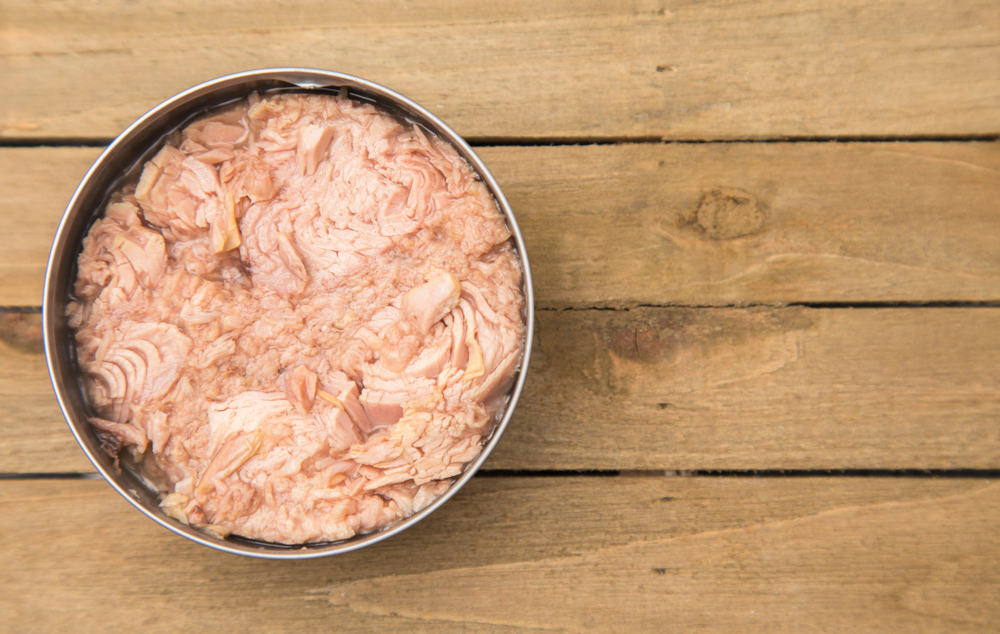Can Dogs Eat Tuna?

Cats come running as soon as you open a can of tuna fish, but what about dogs? Sure, they’ll eat just about anything – but is tuna actually good for them? The answer is that tuna, as long as it’s not canned with oils, is perfectly fine for your dog to eat. Yet, just like with humans, excessive tuna consumption can lead to problems, and you should take possible allergy and diet requirements into consideration first.
In this article, we’ll go through the benefits and health concerns surrounding dogs and the consumption of tuna. We’ll also walk you through the different types of tuna fish, pointing out which ones should be avoided. This way, you’ll know if tuna is right for your dog.

Why Tuna Fish?
Tuna is a go-to fish because it is packed with protein. It’s also a rich and healthy source of omega-3 fatty acids and vitamin B12. It’s loaded with minerals, too, containing potassium, zinc, and calcium. However, tuna also contains mercury, which can be harmful to both humans and animals alike. Therefore, it’s important to be selective when shopping around for a can of tuna for your pet.
What Is a Dog’s Diet?
Dogs are omnivores who thrive when fed a well-balanced diet that is rich in both animal proteins and plant foods. While there are foods they should never eat, dogs do have the ability to digest a wide range of animal products, fish included.
You’ll even find that some dog food brands contain fish like salmon, blue catfish, or at the very least, fish oil and meal. However, when it comes to tuna, it’s very rare to find this type of fish on a dog food brand’s ingredient list.
Just like cats, who are obligate carnivores, dogs can benefit from eating a can of tuna from time to time. There are a ton of benefits from feeding your dog tuna, but there are some drawbacks too.
What Are the Benefits of Feeding Your Dog Tuna?
There are many useful health benefits to eating tuna. Here are the main reasons to choose this fish for your dog’s diet.
It Provides Your Dog With a Source of Lean Protein
Unless you feed your dog specialty food, their diet may be overflowing in the fat department. This can be a cause for concern, which is why many dog owners choose to boost their dog’s lean protein intake. Lean protein feeds the muscles and helps them grow, thereby making your dog stronger, leaner, and healthier.
It Improves Your Dog’s Brain Functions
Tuna fish helps support your dog’s cognitive health by supplying them with vitamins like B3, B6, and B12 that have been shown to benefit brain function.
It Reduces Inflammation in the Body
Tuna is rich in Omega-3 fatty acids. These fatty acids help to reduce the production of harmful substances in the body that cause inflammation. If your dog suffers from chronic inflammation, heart disease, or an inflamed intestinal tract, feeding them tuna can improve their health conditions.
It Improves Eyesight
Omega-3 fatty acids have also been proven to improve eyesight. This is because the retina contains DHA (a type of omega-3) and a lack of DHA in the body can result in macular degeneration. Feeding your dog a diet that is rich in Omega-3 fatty acids can prevent premature vision impairment or blindness.
It Promotes a Healthy Coat
Tuna also helps improve the overall look of your dog’s coat, making it fuller and shinier. Omega-3 fatty acids do a lot to heal the skin — perfect for dogs with skin allergies and/or dandruff.
Why Is Tuna Bad for Dogs?
Although tuna can be a very healthy treat for dogs, the consumption of this large saltwater fish does spark debate amongst pet owners. This is because feeding your dog the wrong type of tuna can be detrimental to their health. You’ll find the most common concerns listed below.
Tuna Is High in Mercury
Some species of tuna contain a lot of mercury. And, when fed to dogs in large amounts, this heavy metal can negatively impact their kidneys, hearts, and nervous systems. To find out more about mercury poisoning in dogs, and how to spot the signs, check out this informative article.
Tuna Is High in Sodium
Canned tuna contains high levels of sodium, which can cause your dog to become dehydrated if they do not consume enough water.
Some Dogs May Be Allergic to Tuna
Just like humans, dogs can be allergic to a variety of foods, and tuna is no exception. A tuna allergy can cause your pup to develop skin conditions — like itchy dry patches, ear infections, or bald spots. It may also cause your dog to experience frequent urination and diarrhea. To prevent this from happening, start by giving your dog a conservative amount of tuna and monitor him or her for signs of discomfort.

What Types of Tuna Fish Are Safe for Dogs?
As you can see, there are plenty of health benefits to feeding your dog tuna. However, it’s important to remember that there are many different types of tuna fish to choose from and that making the wrong choice can result in your dog experiencing side effects.
Can Dogs Eat Canned Tuna?
Yes, dogs can eat canned tuna. But some cans are better than others. When selecting a can of tuna for your dog, there are four important factors that you should consider.
The Species of Tuna
It’s important to take note of the species of tuna you’re dealing with, as larger and older tunas contain larger amounts of mercury. Light tuna contains the least amount of mercury and is the best kind of canned tuna to feed your dog. After light tuna, white albacore tuna is considered to be the safest.
What the Tuna Is Packed With
When buying canned tuna, you must purchase a light tuna that is packed in water and not oil. Feeding your dog a can of tuna that is packed in oil can be very dangerous, as some oils contain harmful ingredients and/or salty and spicy flavorings. Oil also adds unnecessary and fatty calories to your dog’s diet, which can cause obesity.
The Salt Content
Tuna is rich in sodium, which is why selecting a can of tuna that has a reduced level of sodium is ideal. Better yet, give the tuna a rinse in some water before feeding it to your dog.
Where the Tuna Comes From
Lastly, when selecting a can of tuna for your pup, be sure to identify if the tuna was fished from the ocean or farmed in a laboratory. Farm-raised tuna, and fish in general, may contain residual amounts of dyes, toxins, and antibiotics, which can harm your pet.
Can Dogs Eat Raw Tuna?
Although dogs could benefit from a perfectly prepared piece of raw tuna, we wouldn’t recommend feeding this to your pup. Raw fish contains bones which can harm your dog if ingested. And, since fish bones are very small and inconspicuous, giving your dog raw tuna can be a big risk for a very small reward. This is especially true since raw fish can contain parasites and bacteria.
Can Dogs Eat Cooked Tuna?

Dogs can eat cooked tuna. In fact, it’s one of the best ways to feed tuna to dogs. This is because tuna loses a lot of its Omega-3 fatty acids when it is canned, but holds onto a good portion of its nutritional value when grilled. It’s also much easier to spot bones once the fish is fully cooked and shredded.
Baking tuna steak in the oven or boiling it until fully cooked are the best methods for preparing tuna for your dog. Although tastier, grilling tuna invites the use of oil or butter, which aren’t recommended for dogs. Also, keep in mind that you should not season the tuna when cooking it up for your adorable sidekick.
How Do I Feed Tuna to My Dog?
A dog’s stomach can easily get upset when introduced to a new type of food like tuna. Knowing this, it’s best to take things slow. Start by adding a small amount of tuna to your dog’s usual food. Then, monitor your pup to ensure that he or she does not show signs of a food allergy or intolerance.
How Much Tuna Should I Feed My Dog?
Unfortunately, few studies have been conducted to deduce the amount of tuna we should feed our dogs. However, if we use humans as a reference point, this article suggests that larger dog breeds can consume up to one can of light tuna a week. Or, up to half a can of albacore tuna a week.
If you’re interested in giving your dog tuna, but remain concerned, be sure to call your veterinarian for more information. They will help you decipher the right amount of tune to feed to your dog, and how often you should feed it to them.
It’s OK to Feed Your Dogs Tuna, But Moderation Is Key

A good rule of thumb is to feed your dog tuna in moderation. This will ensure that they do not ingest too much mercury and/or sodium while allowing them to reap the benefits tuna has to offer. Dogs love the taste of tuna and can truly benefit from this rich fish — as long as they are fed the right kind and amount.
Final Word
Dogs aren’t too picky when it comes to food, so we doubt they’ll complain when introduced to tuna fish. However, since the good health of our furry family members is of utmost importance, it’s important to be careful and test your dog’s appetite for tuna first to see if there are any issues, or to contact a vet for more support and advice.
Once you know that tuna is right for your pup, you can slowly introduce it into their diet — or surprise them with the occasional tasty treat. Either way, your dogs will love you for it. We wish you and your lovable doggo nothing but the best.




